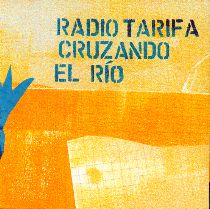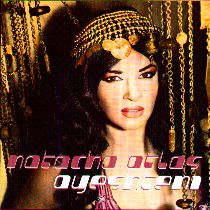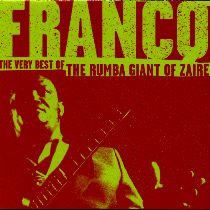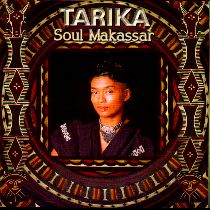 The world music scene continues to go from strength to strength, so much so that fRoots magazine (formerly Folk Roots: www.froots.demon.co.uk) is now in its 22nd year. There is an increasingly wide variety of music available too, and it is hard to do it justice in a short review. What follows is the first of an irregular series of idiosyncratic selections of favorite CDs that have been released (in the UK) in recent months.
The world music scene continues to go from strength to strength, so much so that fRoots magazine (formerly Folk Roots: www.froots.demon.co.uk) is now in its 22nd year. There is an increasingly wide variety of music available too, and it is hard to do it justice in a short review. What follows is the first of an irregular series of idiosyncratic selections of favorite CDs that have been released (in the UK) in recent months.
"Cruzando El Rio" (World Circuit WCD062: www.worldcircuit.co.uk) is the third album from Radio Tarifa who are based in Spain. Their name derives from the fictional radio station located in the Spanish town of Tarifa, which is the closest town to North Africa. The band's music blends together flamenco, North African, and medieval influences in a distinctive style. For their latest outing they have employed electric guitar for the
first time, as well as another host of medieval blown instruments, including ancient oboes and clarinets. There is a nagging familiarity to various parts of the album even though it is unlikely that you have heard anything like this before. Much of the music is of traditional origin, and the band have added (new) words. A lot of it is eminently danceable (such as the swirling strains of "El Viaje De Lea"), and it includes more ballad
like material too (such as "Ramo Verde"). If your Spanish is up to it, I am sure that you can sing along to it too. Ultimately there is a mystical magical feel to "Cruzando El Rio," and if you are looking for something a little bit different which you can relate to, you should start here. Well worth a listen.
 The most contemporary sounding CD of this bunch is "Ayeshteni" (Mantra
MNTCD 1024: www.mantrarecordings.com) by Natacha Atlas. The most obvious
reference point for those with long memories is the late, lamented Ofra
Haza, but given even more of a dance music treatment. Atlas worked as part
of Transglobal Underground for a while, and is aided and abetted here by
the band's Tim Whelan and Hamid Mantu. "Ayeshteni" is an exotic fusion of
North African sounds with programmed beats, which would be packing the
dance floors in a perfect world. Atlas has a terrific, sensual voice that
is perfectly suited to this sort of material, whether she is singing in
English (Screamin' Jay Hawkins' "I Put A Spell On You"), French (Jacques
Brel's "Ne Me Quitte Pas", and "Soleil D'Egypte") or Arabic. The music
swoops and swirls throughout, and there are obvious reference points
between the music here, and that on Radio Tarifa's "El Cruzando
Rio." "Ayeshteni" is a very fine album that just makes you want to get up
and dance.
The most contemporary sounding CD of this bunch is "Ayeshteni" (Mantra
MNTCD 1024: www.mantrarecordings.com) by Natacha Atlas. The most obvious
reference point for those with long memories is the late, lamented Ofra
Haza, but given even more of a dance music treatment. Atlas worked as part
of Transglobal Underground for a while, and is aided and abetted here by
the band's Tim Whelan and Hamid Mantu. "Ayeshteni" is an exotic fusion of
North African sounds with programmed beats, which would be packing the
dance floors in a perfect world. Atlas has a terrific, sensual voice that
is perfectly suited to this sort of material, whether she is singing in
English (Screamin' Jay Hawkins' "I Put A Spell On You"), French (Jacques
Brel's "Ne Me Quitte Pas", and "Soleil D'Egypte") or Arabic. The music
swoops and swirls throughout, and there are obvious reference points
between the music here, and that on Radio Tarifa's "El Cruzando
Rio." "Ayeshteni" is a very fine album that just makes you want to get up
and dance.
 Moving south to the Democratic Republic of the Congo (formerly Zaire, and
before that, the Belgian Congo) we come to "The Very Best of the Rumba
Guitar Giant of Zaire" (Manteca MANTCD013: ) by Franco. Franco was a giant
of a man, as well as a giant of a guitarist. He was a pioneer of the
Congolese rumba, which blends together Latin and African elements, and
ultimately gave rise to soukous. This CD offers a perspective of Franco's
career from the early days of his band OK Jazz in 1956, right through to
1987, two years before his untimely death. The music offers a conjunction
of fantastic (but not flashy) guitar with horns in a style that is made for
dancing. Franco also used his music to educate, praise and criticize: when
"Luvumbu Ndoki" was released it was banned, and led to the jailing of
Franco. Franco always refused to compromise his style, whilst others
around him sold out and adopted western influences. As his career evolved
he moved towards generating epic tunes, such as the closing "Attention Na
SIDA" which warns of the perils of AIDS. The message is delivered in
Lingala and French in order to reach as wide an audience as possible. The
track predates Franco's death by two years from a mystery illness which
many think was HIV related. Franco was a legend in his homeland, and in
his career recorded around 150 albums and wrote over 1000 songs. His death
was marked by several days of national mourning. This CD gives you a
chance to find out for yourself that you have been missing out on some of
the most danceable African music ever made.
Moving south to the Democratic Republic of the Congo (formerly Zaire, and
before that, the Belgian Congo) we come to "The Very Best of the Rumba
Guitar Giant of Zaire" (Manteca MANTCD013: ) by Franco. Franco was a giant
of a man, as well as a giant of a guitarist. He was a pioneer of the
Congolese rumba, which blends together Latin and African elements, and
ultimately gave rise to soukous. This CD offers a perspective of Franco's
career from the early days of his band OK Jazz in 1956, right through to
1987, two years before his untimely death. The music offers a conjunction
of fantastic (but not flashy) guitar with horns in a style that is made for
dancing. Franco also used his music to educate, praise and criticize: when
"Luvumbu Ndoki" was released it was banned, and led to the jailing of
Franco. Franco always refused to compromise his style, whilst others
around him sold out and adopted western influences. As his career evolved
he moved towards generating epic tunes, such as the closing "Attention Na
SIDA" which warns of the perils of AIDS. The message is delivered in
Lingala and French in order to reach as wide an audience as possible. The
track predates Franco's death by two years from a mystery illness which
many think was HIV related. Franco was a legend in his homeland, and in
his career recorded around 150 albums and wrote over 1000 songs. His death
was marked by several days of national mourning. This CD gives you a
chance to find out for yourself that you have been missing out on some of
the most danceable African music ever made.
 Last and by no means least is "Soul Makassar" (Sakar SAKD7037: ) by Tarika
from Madagascar. Tarika (which means "the group") have been together in
various guises for a number of years, and are often described as
Madagascar's biggest musical export. Fronted by singer, songwriter and
percussionist Hanitra (Hanitrarivo Rasoanaivo), "Soul Makassar" is their
fifth album. On it, Hanitra explores some of the strong links between the
musical traditions of Madagascar and those of Polynesia: the first settlers
in Madagascar came from Indonesia around 1500 years ago.
Last and by no means least is "Soul Makassar" (Sakar SAKD7037: ) by Tarika
from Madagascar. Tarika (which means "the group") have been together in
various guises for a number of years, and are often described as
Madagascar's biggest musical export. Fronted by singer, songwriter and
percussionist Hanitra (Hanitrarivo Rasoanaivo), "Soul Makassar" is their
fifth album. On it, Hanitra explores some of the strong links between the
musical traditions of Madagascar and those of Polynesia: the first settlers
in Madagascar came from Indonesia around 1500 years ago.
The music features several indigenous instruments, including the valiha
(tube zither) which was derived from a similar Polynesian instrument. More
familiar instruments, such as guitar and keyboards are also present. The
combination creates a music which is permeated by a joyous feeling even
though the message of some of the songs is very serious, such as "Kingsong"
which is about the status of women in Swaziland and was written to be
played before the King. The liner notes Hanitra provides a background
sketch for each of the songs, which include fascinating historical
sketches, such as "Tovovavy." This tells the story of those Indonesian
women who have, over the years, deliberately hid from the sun because they
wanted their skin to be white. They began doing this before they were
first visited by white people. Hanitra notes the parallel with people form
her tribe (the Merina) in Madagascar who always carry umbrellas to keep the
sun off. Even though you may not understand the language or the lyrics,
after two or three listens you are guaranteed to be trying to sing along to
catchy tunes like the opening "Koba." "Soul Makassar" is one of my
favorite albums of 2001.
This review is copyright © 2001 by Gordon Baxter, and Blues On Stage, all rights reserved. Copy, duplication or download prohibited without written permission. For permission to use this review please send an E-mail to Ray Stiles.
